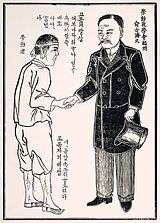Manhwa
 |
| Part of a series on the |
| Culture of Korea |
|---|
| History |
|
Music and performing arts |
|
|
Monuments |
|
National symbols of Korea |
|
| Manhwa | |
| Hangul | 만화 |
|---|---|
| Hanja | 漫畫 |
| Revised Romanization | manhwa |
| McCune–Reischauer | manhwa |

Manhwa (Hangul: 만화, Korean pronunciation: [manhwa]) is the general Korean term for comics and print cartoons (common usage also includes animated cartoons). Outside Korea, the term usually refers to South Korean comics,[1] although the comics industry is emerging in North Korea as well.[2]
History of the term
Linguistically, 漫画 (manga), 漫畫 (manhua), 만화 (漫畫 manhwa), and 만필화 (漫筆畫, manpilhwa) all mean comics in Japanese, Chinese, and Korean respectively. The term, along with manga, is a cognate of the Chinese manhua. Their current use is largely explained by the international success of the Japanese manga. Although in a traditional sense, in these languages the terms manga/manhua/manhwa had a similar meaning of comical drawing in a broad way, nowadays the term generally designate the manga-inspired comic strips. The author or artist of a manhwa is called a manhwaga (만화가).
Adaptation of term
The relative obscurity of Korean culture in the Western world has caused the word "manhwa" to remain somewhat unknown in the English-speaking world. Instead, English translations of manhwa have achieved success by targeting the manga and anime community, to the extent that manhwa are often marketed as "manga."
Webtoons
Webtoons first came into popularity in the early 2000's due to their free access and availability on the internet. Since their creation, webtoons have gained popularity around the globe and have even been adopted outside of Korea as another form of comic publication.[3] This is credited to their unique format and pay model.
Korean manhwa publishers
- Daewon C.I.
- Haksan Culture Company
- Seoul Culture Corporation
- Shinwon Agency Corporation
Manhwa in the United States
Sanho Kim was the first manhwa artist working in the States. During the 60s and 70s, he worked for publishers Charlton Comics, Warren Publishing, Iron Horse Publishing, Skywald Publications and Marvel Comics.[4]
According to journalist Paul Gravett, in 1987 Eastern Comics published the first original manhwas in the United States.[5]
Due to the explosion of manga's popularity in the Americas, many of the licensed titles acquired for the American market seek to emulate the popular elements of other successful series.[6] Recently, long-running webcomics serialized via Internet portal sites (e.g. by Daum Media)[7] and personal homepages have become both the creative and popular basecamp among the younger generation in Korea.
Direction of text
Manhwa is read in the same direction as English books, horizontally and from left to right, because hangul is normally written and read horizontally, although it can also be written and read vertically from right to left, top to bottom.
North American manhwa imprints
Animation and live-action adaptations
Animation based on Korean comics is still relatively rare (though there were several major hits in the late 1980s and early 90s with titles such as Dooly the Little Dinosaur and Fly! Superboard). However, live-action drama series and movie adaptations of manhwa have occurred more frequently in recent years. Full House in 2004 and Goong ("Palace" or "Princess Hours") in 2006 are prominent examples, as both have been counted as the best dramas of their respective years.
In 2004, Blade of the Phantom Master was adapted into an animated film by a joint Korean-Japanese animation team.
SamBakZa produced There she is!! in 2006, which is about the developing relationship of a rabbit and a cat.
The Great Catsby, ran as an onstage musical in 2006. In 2007, the award-winning Korean webcomic was adapted into a live-action drama. The title was also planned to be adapted into a feature film in late 2007.[8]
War of Money, a dramatized manhwa that aired in 2007, garnered much attention for its soundtrack and actors.
Priest, a manhwa by Hyung Min-woo that has been translated to English, was adapted into the 2011 American sci-fi action horror film of the same name by Screen Gems. Released in 2011,[9] it was produced by Michael DeLuca, directed by Scott Stewart, and stars Paul Bettany as the title character.[10][11]
Secretly, Greatly, a film based on a manhwa webcomic, became a top-grossing film in 2013.[12][13][14]
See also
References
- ↑ "Mangaka". www.mangaka.co.uk.
- ↑ Stahler, Kevin (September 29, 2013). "Comics in North Korea". Peterson Institute for International Economics. Retrieved February 21, 2017.
- ↑ "Webtoon, Why So Popular?". Retrieved 2014-09-15.
- ↑ Kim entry, Lambiek's Comiclopedia. Accessed June 9, 2011.
- ↑ Paul Gravett. Make Mine Manhwa!: Exporting Korean Comics
- ↑ Arnold, Andrew D. (2006-01-25). "Life and Literature Without Robots". Time. Retrieved 2010-05-12.
- ↑ "Daum 웹툰". Daum 웹툰.
- ↑ "The Great Catsby: Hit Korean Internet Comic Drama-tized into TV form debuts in 4 days". Retrieved 2007-07-01.
- ↑ "Corrosion: Cold Winter Waiting Available for Digital Download - Dread Central". www.dreadcentral.com.
- ↑ Olsen, Kevin Noel (January 25, 2007). "Amityville Director Set to Direct Priest Film Based on Tokypop Graphic Novel" Archived 2007-10-12 at the Wayback Machine.. Silver Bullet Comics.
- ↑ Fischer, Martha (June 26, 2006). "Butler to Priest". Cinematical.com.
- ↑ "Celebrity - Yahoo Lifestyle Singapore". ph.omg.yahoo.com.
- ↑ http://twitchfilm.com/2013/06/korean-box-office-not-so-secret-secretly-greatly-break-records.html
- ↑ "'Secretly Greatly' Blazes Trail at Box Office by Tapping Teen Audience". chosun.com.
- Son Sang-ik (1999). 한국만화통사 1 (General History of Manwha 1) (in Korean). Sigongsa. ISBN 89-7259-890-9.
- Hart, Christopher (2004). Manhwa mania : how to draw Korean comics. New York: Watson-Guptill Publications. ISBN 0-8230-2976-X.
- Kim Jinsu (2007-06-02). "개화기 일제의 시사만화 탄압 (The Japanese oppression on Sisa manhwa)" (in Korean). Chammalo.
- 만화 (in Korean). Empas/ Encyclopædia Britannica.
- "Manhwa" (in Korean). Empas/ EncyKorea.
- Sim Ji-hoon. "Korea Manhwa Museum". INISteel Webzine (in Korean).
- Sugiyama, Rika (2004). Comic artists — Asia : manga, manhwa, manhua. New York: Harper Design International. ISBN 0-06-058924-8.
- "Korean Comics in the U.S., Part 1, Comic-Con International 2004," Jade Magazine.com, Sep. 2004
- "Korean Comics in the U.S., Part 2, Manhwa Sampler," Jade Magazine.com, Sep. 2004
- "Sang-Sun Park, Les Bijoux Comic Artist," Sequential Tart.com, Aug. 2004
- Manhwa site for "Demon Diary" (마왕일기)
- "Infinity Studios and Manhwa," Anime Tourist.com, 16 June 2004
- Our Toys, Our Selves: Robot Taekwon V and South Korean Identity
- Cain, Geoffrey. "Will the Internet Kill the Manhwa Star?" The Far Eastern Economic Review, November 6, 2009
